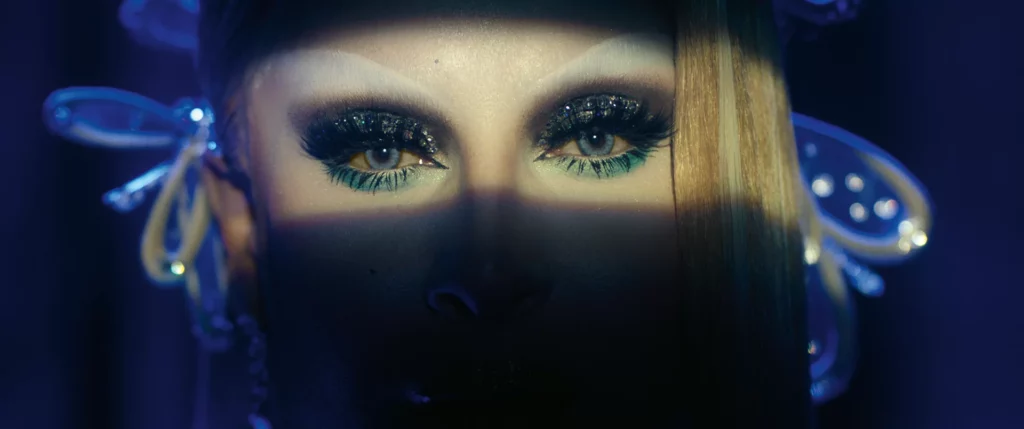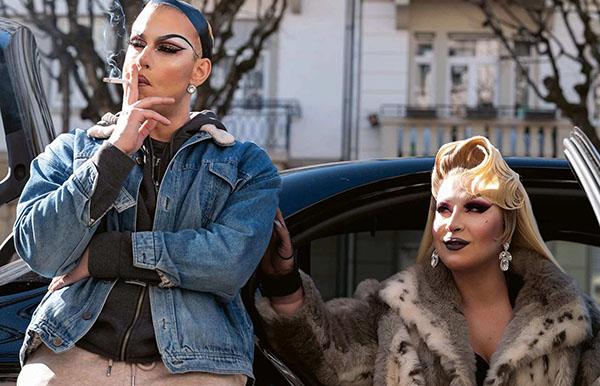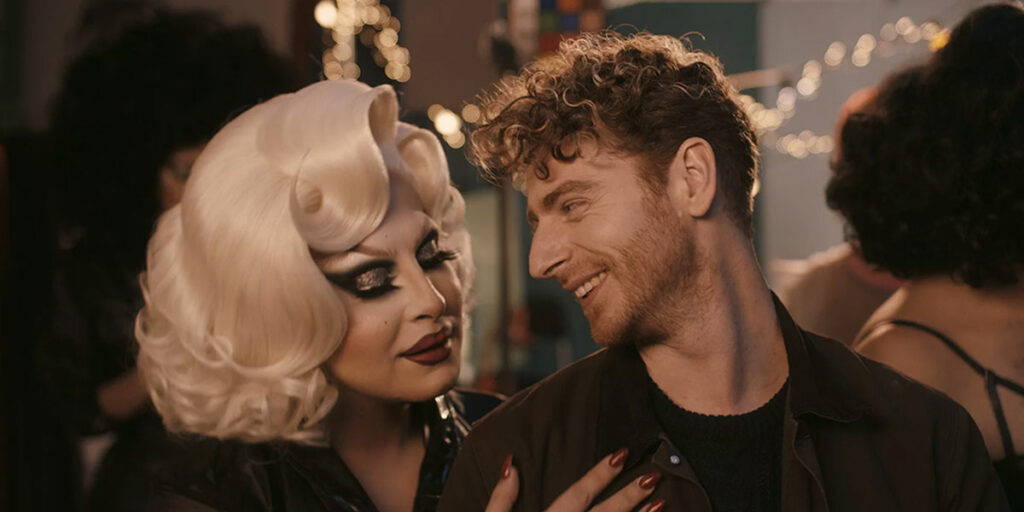Florent Gouëlou’s Three Nights A Week is a poignant story of acceptance, love, freedom, and the contradictions that define us.
The protagonist of Florent Gouëlou’s Three Nights A Week (Trois Nuits Par Semaine) is a 29-year-old man named Baptiste (Pablo Pauly, of The French Dispatch). When we first meet him, it’s nighttime, and his girlfriend Samia (Hafsia Herzi, of You Deserve A Lover) is doing volunteering work for an an awareness campaign set up for World AIDS Day by the clinic where she works. Since photography is a hobby of Baptiste’s, he has decided to help out by taking pictures for the clinic, and he’s hanging around the area with his camera, waiting to be inspired. And inspiration does, indeed, come: only, it’s in the form of a young drag queen who goes by the name of Cookie Kunty (Romain Eck, of Emily in Paris), with whom Baptiste suddenly and unexpectedly locks eyes.
Cookie notices him too, and slowly approaches him. He serves her coffee, she thanks him with a “merci, mon cher“, and, just like that, a spark is born. The camera moves in on Cookie’s face and, just like Baptiste, we can’t help but stare at her, mesmerised by someone who stands out in the best possible way, her eyes lit up by gorgeous shades of blue and her confidence coming through in everything she says and does.
There’s almost an otherwordly quality to Cookie, who seems to have a calming, hypnotic effect on the people around her, and Baptiste notices it too, so much so that he immediately asks if he can take her picture. The moment is eventually interrupted by Samia, whose opinion of drag queens couldn’t be more different from her boyfriend’s, and ends with Cookie walking away with a flirtatious “À plus tard, l’homme marié” (“See you later, married man”) – a chance encounter that marks the beginning of a journey for both Baptiste and Cookie, who will not only grow a great deal but also change one another for the better.
It’s not an easy journey that our two protagonists embark on, and writer and director Florent Gouëlou (who is also drag queen Javel Habibi at night) and co-writer Raphaëlle Desplechin (Olga) cleverly defy our expectations more than once, giving us a story that initially seems to follow traditional tropes – a meet-cute that turns into something more – and then slowly becomes something else entirely. It’s a film that rewards us with beautiful moments of liberation, but that also frustrates us with humiliating scenes we didn’t see coming and character choices that only make sense at the very end. But that’s the beauty of Three Nights A Week: Gouëlou’s film is unlike anything you’ve seen before, as it absolutely succeeds not only as a love story and a tale of liberation, but also as a profound meditation on the many different versions of us that coexist within ourselves.

The theme of the double is everpresent in Three Nights A Week, starting with the character of Cookie, who becomes a different person when she takes off her makeup and goes back to being Quentin. In fact, it often feels like the film is depicting a love story between three people: not just Baptiste and Quentin, but also Cookie, who is just as important to Quentin as Baptiste is. But there’s also Baptiste himself, who experiences a sexual awakening of sorts but who initially doesn’t know if he’s fallen for Cookie, or Quentin, or both.
And then there’s the matter of Baptiste trying to figure out who he is: is he the good boyfriend who leads a conventional life and avoids being the centre of attention, or is he the unhinged, confident man who takes over the dancefloor, falls for strangers, and poses for drawings? But that’s not all: there’s also Cookie herself, whose relationship with Baptiste changes depending on whether she’s the larger-than-life Cookie Kunty or the surprisingly insecure Quentin, who, just like Baptiste, is also in desperate need of self-love.
The true brilliance of Three Nights A Week lies in the fact that the story is told from the point of view of a character we can relate to, and Pablo Pauly excels at showing us the many sides of a character who can be quiet and reflective but also incredibly brave, making us feel every single experience he has as if we were right there with him. Pauly alone carries some of the most poignant scenes of the film, fully embodying Baptiste whether he’s in a crowded room or on his own and giving us a character who’s not only relatable but also so very human.
Romain Eck is just as impressive, having to embody not only Cookie but also Quentin – two characters who are, at the same time, incredibly different from one another but also, somehow, part of one another, and essential to each other’s lives. In their fourth collaboration with Gouëlou (after short films Un Homme Mon Fils in 2017, Beauty Boys in 2019, and Premier Amour in 2020), both Eck and Cookie absolutely shine, and their chemistry with Pauly is just as convincing.
When dealing with marginalised groups, it’s not unusual for a film to add social commentary to the equation, and sometimes the risk is sacrificing the story in order to try and make a statement. But Gouëlou and Desplechin absolutely nail that balance by always focusing on Baptiste and Quentin but also making us aware of the kind of discrimination that Cookie and her friends have to endure every day.
These moments are cleverly weaved into the script, whether it’s an act of verbal or physical violence, an offensive remark, a “vocab lesson” on pronouns gone wrong, or even just a waitress glancing at Quentin’s long, painted nails and Quentin immediately trying to hide them, ashamed, as if by habit. Not only that, but the film never fails to remind us of the struggles that some of Cookie’s friends have faced, as subjects like AIDS are brought up in a few strategic scenes that are bound to make you think.

If you’ve read the film’s synopsis and looked at the pictures on this page, I can guarantee that it’s absolutely not what you’d expect it to be. Both beautifully earnest and unapologetically original, Three Nights A Week is, at the same time, a tender story of queer love, a tale of sexual liberation, a clever look at universal struggles, and an invitation to be exactly who you want to be at any given time. Not to be missed.
Three Nights A Week opened the International Critics’ Week at the 2022 Venice Film Festival on September 2, 2022, and will be released in France on November 9.

